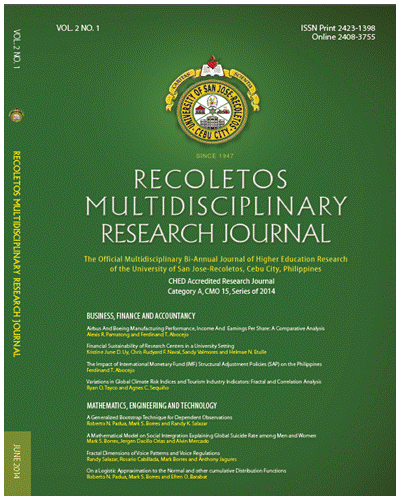Assessment of Students’ Learning on a Fractal Viewpoint
DOI:
https://doi.org/10.32871/rmrj1402.01.13Keywords:
assessment, fractal dimensions, fractal analysis, test scores, students’ learningAbstract
This study explores the fractal dimensions of students’ cognitive skills according
to the levels of difficulty using fractal model approach and analysis. The data utilized were from the test results based on the competency-based constructed items. Findings revealed that data sets obey a non- normal distribution as depicted in histograms and normality tests that yield to fractal statistical analysis. Hence, subjects with lesser fractal dimension and disparity value tend to be less rough and rugged whereas subjects with higher fractal dimension and high disparity value is perceived to be more irregular. This result has a great impact in exploring the fractality of test scores that will lead to a deeper understanding on students’ authentic performance with a direct, relevant and realistic application of learning as emphasized in the implementation of Outcomes-based Education (OBE).
References
Bloom, B. (1970). SLOs, Bloom’s Taxonomy, Cognitive, Psychomotor, and Affective Domains. Retrieved June 19,2013, from http://www.craftonhills.edu/~/media/Files/SBCCD/CHC/Faculty%20and%20
Staff/SLOs/Step%201/Blooms%20Taxonomy%20and%203%20Domains%20of%20Learning.ashx
Clarke, D. (1988). Assessment alternatives in mathematics. Journal of Education on Testing. Canberra: Curriculum Corporation
Jaeger, O. (1997). What one intelligence test measures: a theoretical account of the processing in the Raven Progressive Matrices Test. Psychology Review: Ed.II. Vol.1, IV. DS.
Kilpatrick, J. (1993). The chain and the arrow: From the history of mathematics assessment. In M. Niss. (Ed.), Investigations into assessment in mathematics education. An ICMI Study. Dordrecht: Kluwer.
Mitchell, C., & Koshy, V (1993). Effective teacher assessment: Looking at children ‘s learning in the primary classroom. London: Hodder
& Stoughton.
Niss, M. (1993). Assessment in educational learning and its effects: An introduction. In M. Niss.(Ed.), Investigations into assessment
education.
Padua, R. N. (2013, March). Data Roughness and Fractal Statistics. Cebu Normal University Journal of Higher Education. Cebu, Cebu, Philippines: Cebu Normal Press.
Raven, J., Raven, J. C., & Court, J. H. (1998). Manual for Raven’s Progressive Matrices and Vocabulary Scales. San Antonio, TX:
Harcourt Assessment.
Stephen, P. (2002). Toward Real Educational Testing. Retrieved June 20,2013, from http://theemergencesite.com/Tech/FourStates-of-Learning-Wk061120.html
Stenmark M. (1991). Reshaping assessment practices: Assessment in the mathematical sciences under challenge. Hawthorn, Vic: Australian Council for Educational Research.
Swan, M. (1993a). Assessing a wider range of students’ abilities. In Webb, N.L. & Coxford, A.F. (Eds.). Assessment in the mathematics
classroom. Reston, VA: NCTM.
McGreggor, K., Kunda, M., & Goel, A., (2010). A fractal analogy of Raven’s Intelligence Test. In AAAI Workshops. Design & Intelligence
Laboratory, School of Interactive Computing, Georgia Institute of Technology, Atlanta, GA 30332, USA
Downloads
Published
How to Cite
Issue
Section
License
Copyright of the Journal belongs to the University of San Jose-Recoletos


